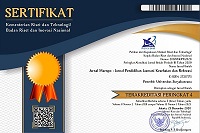Movement Skills Learning Model in Physical Education Against Psychological Student Personality: A Systematic Riview
Abstract
The right motion learning model in physical education will improve the psychological aspects of the student's personality. however, different subjects and interventions should have different impacts. The purpose of this study is to review learning models in physical education that relate to the psychological aspects of students from elementary to high school. The method used is a systematic review, using secondary data from published journals. Data collection was carried out manually outside the database and with the help of access to the Google Scholar database. In searching the data, keywords that are relevant to the topic to be discussed are used. The keywords used were “psychological personality†AND “emotional†AND “mental†AND “social behavior†AND “physical educationâ€. After that, an analysis will be carried out using a prisma flowchart diagram. The results of filtering data according to the inclusion and exclusion criteria are 20 national and indexed Sinta journals. Based on the results of the analysis of various models, the application of the outdoor physical education learning model and the cooperative model is more widely applied to junior high school students and above. Meanwhile, elementary schools apply more game-based learning. Therefore it is important for educators to know and understand the characteristics of each student for the selection of learning models so that it has a positive impact on aspects of the psychological personality of students.
Key words: Learning Model, Physical Education, Personality Psychology.
Full Text:
PDFReferences
Arianti, W., Budiman, D., & Slamet, S. (2020). Implementasi Model Pendidikan Gerak sebagai Upaya Meningkatkan Kepercayaan Diri Siswa. TEGAR: Journal of Teaching Physical Education in Elementary School, 3(2), 1–6. https://doi.org/10.17509/tegar.v3i2.23397
Armitage, R. (2021). Bullying in children: impact on child health. BMJ Paediatrics Open, 5(1). https://doi.org/10.1136/BMJPO-2020-000939
Bejerot, S., Ståtenhag, L., & Glans, M. R. (2022). Below average motor skills predict victimization from childhood bullies: A study of adults with ADHD. Journal of Psychiatric Research, 153(December 2021), 269–275. https://doi.org/10.1016/j.jpsychires.2022.07.019
Budiman, B., Rusmana, R., & Wargadinata, L. U. (2020). Outdoor Education Of Emphathy Student. Jp.Jok (Jurnal Pendidikan Jasmani, Olahraga Dan Kesehatan), 4(1), 117–127. https://doi.org/10.33503/jp.jok.v4i1.873
Cervone, D., & Pervin, L. A. (2011). Personality: Theory and Research (10th ed.). Jakarta: Salemba Humanika.
Ericsson, I. (2011). Effects of increased physical activity on motor skills and marks in physical education: an intervention study in school years 1 through 9 in Sweden. Physical Education and Sport Pedagogy, 16(3), 313–329.
https://doi.org/10.1080/17408989.2010.545052
Febriyani, T., Kurniawan, F., & Effendi, R. (2020). Kepercayaan Diri Siswa dalam Pembelajaran Lompat Harimau. Jurnal Altius, 9(2), 92–99. https://doi.org/https://doi.org/10.36706/altius.v9i2.13001
GarcÃa-Hermoso, A., Alonso-MartÃnez, A. M., RamÃrez-Vélez, R., Pérez-Sousa, M. Ã., RamÃrez-Campillo, R., & Izquierdo, M. (2020). Association of Physical Education With Improvement of Health-Related Physical Fitness Outcomes and Fundamental Motor Skills Among Youths: A Systematic Review and Meta-analysis. JAMA Pediatrics, 174(6), e200223–e200223. https://doi.org/10.1001/JAMAPEDIATRICS.2020.0223
Ginanjar, G., & Budiana, D. (2018). Penerapan Model Pembelajaran Hellison Untuk Meningkatkan Nilai Tanggung Jawab Siswa Dalam Penggunaan Alat Pembelajaran Penjas. TEGAR: Journal of Teaching Physical Education in Elementary School, 1(2), 41. https://doi.org/10.17509/tegar.v1i2.11937
Juliantine, T., & Ramadhan, U. (2018). Pengembangan Tanggung Jawab dan Perilaku Sosial Siswa Melalui Model TPSR Dalam Pendidikan Jasmani. Jurnal Sosioteknologi, 17(3), 350–354. https://doi.org/10.5614/sostek.itbj.2018.17.3.2
Leonardo, A., & Komaini, A. (2021). Hubungan Aktivitas Fisik Terhadap Keterampilan Motorik. Jurnal Stamina, 4(3), 135–144. Retrieved from http://stamina.ppj.unp.ac.id/index.php/JST/article/view/764
Moher, D., Liberati, A., Tetzlaff, J., Altman, D. G., Altman, D., Antes, G., … Tugwell, P. (2009). Preferred Reporting Items for Systematic Reviews and Meta-Analyses: The PRISMA Statement. PLOS Medicine, 6(7), e1000097.
https://doi.org/10.1371/JOURNAL.PMED.1000097
Mustafa, P. S., Winarno, M. E., & Supriyadi, S. (2019). Penilaian Pendidikan Jasmani, Olahraga, dan Kesehatan pada Sekolah Menengah Pertama Negeri Kota Malang. Jurnal Pendidikan: Teori, Penelitian, Dan Pengembangan, 4(10), 1364–1379. https://doi.org/10.17977/JPTPP.V4I10.12845
Mylsidayu, A. (2015). Psikologi Olahraga (2nd ed.; Suryani, ed.). Jakarta: Bumi Aksara.
Pratama, N. Y., & Hudah, M. (2020). Pendekatan Permainan Outbound Sirkuit Game Dalam Meningkatkan Kematangan Emosional Dan Spitual Melalui Pembelajaran Penjas Pada Siswa Smp N 1 Sumowono. Journal of Sport Coaching and Physical Education, 5(1), 8–13. https://doi.org/10.15294/JSCPE.V5I1.36566
Purbangkara, T., & Nasution, N. S. (2019). Pengaruh Pembelajaran Outdoor Education Pendidikan Jasmani dalam Pembentukan Kecerdasan Emosional pada Siswa MAN 3 Karawang. Jspeed, 2(1), 69–77. https://doi.org/https://doi.org/10.35706/speed.v2i1
Rudd, J. R., O’Callaghan, L., & Williams, J. (2019). Physical education pedagogies built upon theories of movement learning: How can environmental constraints be manipulated to improve children’s executive function and self-regulation skills? International Journal of Environmental Research and Public Health, 16(9). https://doi.org/10.3390/ijerph16091630
Rustiana, E. R. (2013). Upaya Peningkatan Kecerdasan Emosi Siswa Sekolah Dasar Melalui Pendidikan Jasmani Harmoni. Cakrawala Pendidikan, (1), 139–149.
Setiawan, A., Yudiana, Y., & Rahmat, A. (2018). Pengaruh Pembelajaran Bola Tangan terhadap Perilaku Sosial Siswa. Jurnal Pendidikan Jasmani Dan Olahraga, 3(1), 89–94. https://doi.org/10.17509/JPJO.V3I1.10188
Sofiarini, A. M. (2016). Hubungan Antara Pembelajaran Penjas Dengan Perilaku Sosial Siswa (Studi Deskriptif di SMA Negeri 10 Kota Bandung). Jurnal Pendidikan Jasmani Dan Olahraga, 1(1), 68–76. https://doi.org/10.17509/JPJO.V1I1.3665
Sriwahyuniati, F. (2017). Belajar Motorik (1st ed.). Yogyakarta: UNY Press.
Syafrida, R. (2012). Kajian Peningkatan Keterampilan Motorik Kasar Anak di Kota Banda Aceh. Visipena, 3(2), 79–89. https://doi.org/10.46244/VISIPENA.V3I2.60
Wahyudi, W., Budiman, D., & Saepudin, E. (2018). Penerapan Model Pembelajaran Kooperatif Tipe TGT dalam Pembelajaran Permainan Bola Besar Berorientasi Sepak Takraw untuk Meningkatkan Kerjasama dan Keterampilan Bermain. TEGAR: Journal of Teaching Physical Education in Elementary School, 2(1), 9. https://doi.org/https://doi.org/10.17509/tegar.v1i2.11732
Wardana, A., Priambodo, A., & Pramono, M. (2020). Pengaruh Model Pembelajaran Jigsaw dan Teams Games Tournament Terhadap Karakter Kepedulian Sosial dan Kejujuran dalam Pendidikan Jasmani Olahraga Kesehatan. JOSSAE (Journal of Sport Science and Education), 5(1), 12–24. https://doi.org/10.26740/JOSSAE.V5N1.P12-24
DOI: https://doi.org/10.35194/jm.v12i2.2791
Refbacks
- There are currently no refbacks.
Copyright (c) 2022 Jurnal Maenpo : Jurnal Pendidikan Jasmani Kesehatan dan Rekreasi

This work is licensed under a Creative Commons Attribution-ShareAlike 4.0 International License.




1.png)

.png)


.png)





(1)_.png)
_.png)









